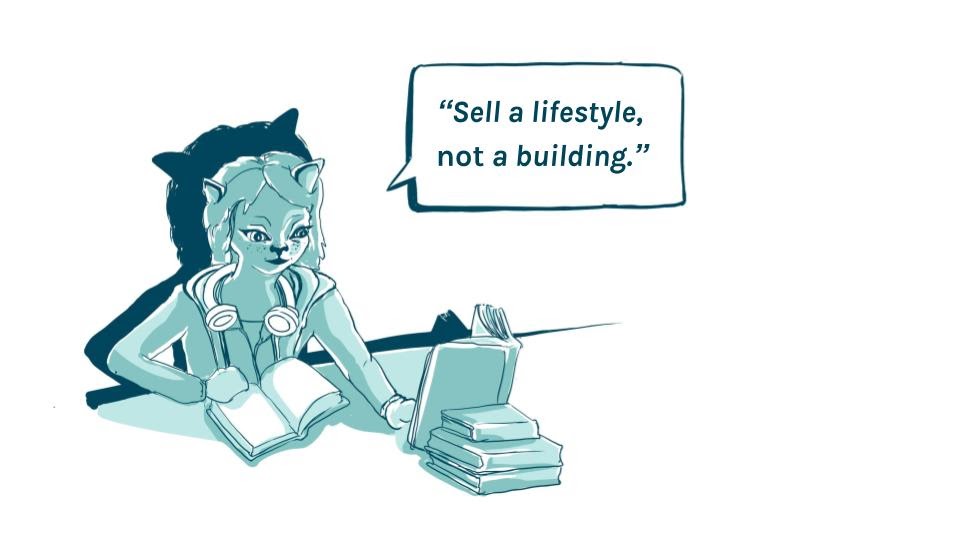Written by Copycat Staff
July 29th, 2020
Tips and Tricks for Copywriting for Real Estate

When you close your eyes and envision your ideal future, what do you see?
Maybe you picture yourself traveling the world, exploring diverse cultures, and trying exotic cuisines. You’re trekking up Machu Picchu, exploring the beaches of Bali, and perusing the streets of Paris. Adventure awaits you at every turn.
Or maybe you’re suddenly transported to your wedding day, standing next to the love of your life, teary-eyed and filled with joy. A sense of peace overwhelms you. Your white picket fence fantasy is finally coming true.
Real Estate and The American Dream
For many Americans, homeownership is a part of their dream. In fact, over 65% of Americans have made this dream come true through a combination of hard work and scrupulous saving.
However, the 5.96 million homes that are purchased each year don’t get sold on their own.
It takes a dedicated team of professionals to get the job done, made up of:
- Real estate agents
- Interior designers
- Mortgage brokers
- Home inspectors
- Home appraisers
Last but not least, the real estate industry relies heavily on copywriters to produce captivating marketing materials. If you want to become a real estate copywriter, you need to understand what the industry is all about.
Matchmaker, Matchmaker, Make Me a Match
Real estate professionals are essentially matchmakers in disguise.
They look for properties for their clients as if they were looking for their perfect mate.
They listen carefully to clients’ desires (3 bedrooms, 2 baths, big yard, etc.), and then they pay even closer attention to the emotional motivations behind these preferences (privacy, safety, security, status, etc.).
True real estate aficionados understand that a potential client needs a home to “feel right” in order to go through with the purchase. Thus, the art of selling real estate is all about instilling that feeling of a match made in heaven.
The High Demand For Real Estate Copywriters
While emotions drive real estate sales, there’s a lot more going on behind the scenes. A real estate agent has the following responsibilities:
- Organizing open houses
- Scheduling showings with prospective buyers
- Submitting bids to sellers
- Filling out the necessary paperwork
With so much on their plate, most real estate agencies don’t have the time or creative resources to write compelling copy on their own. That’s where copywriters, like you and I, come in.
What Does Copywriting For Real Estate Entail?
Armed with a proficiency of language, a real estate writer produces the following types of content:
- Product listings
- Blog articles
- Website landing pages
- Property brochures
- Etc.
As a real estate copywriter, most of your work will be featured online. The goal of this online content is to:
- Create more desire for a property
- Educate buyers on how to navigate the real estate market
- Attract more inquiries for a property listing
- Increase attendance to an open house
If done well, your writing has the potential to connect droves of potential buyers with their dream properties. In turn, you can think of yourself as a matchmaker as well.
Copycat’s Tips and Tricks For Real Estate Copywriting
So how can you write compelling real estate marketing copy?
Here are some tricks of the trade that will improve your real estate copywriting.
Tip #1: Describe a Lifestyle, Not a Building
Have you been on Netflix recently? If so, you’ve probably heard of the trending reality show, “Selling Sunset.”
This show follows the lives of ambitious real estate agents in Los Angeles. They hustle to sell some of Hollywood’s most exquisite homes, with clientele ranging from well-known celebrities to foreign billionaires.
The ladies of Selling Sunset sell a lifestyle. They sell the feeling of having “made it” in LA. This simple strategy earns them millions of dollars in commission each year.
While you may not be writing for the Los Angeles elite, the same underlying principle applies to real estate copywriting.

Tip #2: Dive Into the Psychology of Your Target Audience
Not everyone in the real estate market is there for the same reason. Real estate agents discover clients’ motivation in person. This enables them to develop a sixth sense about what actually drives their client’s preferences.
As a copywriter for a real estate business, you don’t have this luxury. However, you’re still expected to understand your target audience on an intimate level. You just have to do some strategic online research.
Online forums are a great place to kick off your research, since they’re organized into convenient, niche communities. By immersing yourself in your target market’s world (whether they’re a divorced dad or an eager entrepreneur), you can discover what makes them tick.
Dream Lifestyles Differ Depending on Your Target Audience
Here are a few common real estate players you’ll have to write for at some point or another:
- A growing family who’s ready to purchase their first home
- A newly-married couple that wants to start their life together
- A recent divorcée who’s selling her home to prepare for a fresh start
- An ambitious real estate mogul looking to multiply his wealth
- An out-of-state seller who inherited a property from a deceased loved one
Each of these groups has drastically different priorities, fears, and insecurities. By discovering what they are, you can tailor your copywriting services to be captivating for the correct audience.
Tip #3: Tap Into Their Core Values
Each reader’s ideal lifestyle is founded on core values. By strategically tapping into the right values, you’ll resonate with readers on a deeper level.
Here are a few core values that motivate real estate purchases:
- Safety – A growing family might be deeply concerned about the safety of a neighborhood, since they want their kids to play outside freely, out of harm’s way.
- Security – A newly-married couple might be interested in real estate to establish more financial security together.
- Status – A wealthy bachelor might want a luxurious home to show off his impressive wealth to the ladies.
- Social connections – An older couple might want to live close to town, church, and family to enjoy the company of their loved ones with ease.
- Starting fresh – A divorcée or out-of-state buyer might be planning a new chapter in their life, driven by a longing for a fresh start.
Once you’ve locked down your target audience’s core values, you can speak their language and tailor your copywriting accordingly.
Tip #4: Create an Emotional Connection Through Storytelling
One rookie mistake of copywriting is overloading readers with wordy real estate jargon. Don’t write a long list of property features and call it a day. While features are a great jumping-off point, they shouldn’t be the primary focus.
Here are a few storytelling techniques to try out:
- Describe the property’s history – Does your property have a unique history? If so, let this be known. For instance, if you’re writing about a 1950s ranch home, you can explain how this style was popularized during World War II. This narrative can transform an outdated “fixer-upper” into a meaningful piece of American history.
- Describe a day in the life in this property – Are you writing about a California coastline mansion? If so, paint a picture of what it’s like to live in this home. Tap into all five senses. Describe the feeling of the fresh ocean breeze and the sound of the ocean waves lapping on the shore. The more vivid you can make your writing, the better.
- Focus on a property’s unique amenities – Does your home feature a big backyard with an expansive pool and firepit? In this case, tell a story of fun-filled weekend BBQs, pool parties with the kids, and peaceful summer evenings spent outdoors, drinking a glass of wine and overlooking the fire.
- Describe the property’s surrounding neighborhood – Is your property located in the heart of a thriving city? If so, center your storytelling around the short commute to work, nights out on the town, and ample opportunities to mingle with other young professionals.
- Explain a property’s investment potential – Did you know that most millionaires got rich by investing in real estate? If you're writing about a commercial property, focus on how it will improve the reader’s investment portfolio. The emotion you want to evoke in your investment-minded readers is confidence.
Coming up with the right story is easy(er) when you know who you’re writing for.
When done effectively, prospective buyers will envision themselves in your property. In turn, they'll be eager to schedule a showing.
Copycat Copywriters: Experts at Copywriting For Real Estate
Are you ready to put these real estate copywriting tips to the test? If so, consider becoming a writer at Copycat. We’re always looking for talented cats to add to our team.
And while we Copycats spend most of our time gazing from windows and scratching the side of oh-so-scratchy furniture, we also have extensive experience writing for the real estate niche.
If you’re in need of great copywriting services for your real estate company, we’d love to show you our skills. At Copycat, we match each of our clients with a writing team that’s perfect for their niche. In turn, you could consider us matchmakers as well.
So what are you waiting for? Reach out to us for a free piece of content today!
Sources:
Statista. Homeownership rate in the United States from 1990 to 2019.
https://www.statista.com/statistics/184902/homeownership-rate-in-the-us-since-2003/
Satista. Total home sales in the United States from 2011 to 2020.
https://www.statista.com/statistics/275156/total-home-sales-in-the-united-states-from-2009/
Bigger Pockets. 7 Reasons Why 90% Of Millionaires In U.S. Are Invested In Real Estate.
https://www.biggerpockets.com/member-blogs/10019/85450-7-reasons-why-90-of-millionaires-in-us-are-invested-in-real-estate